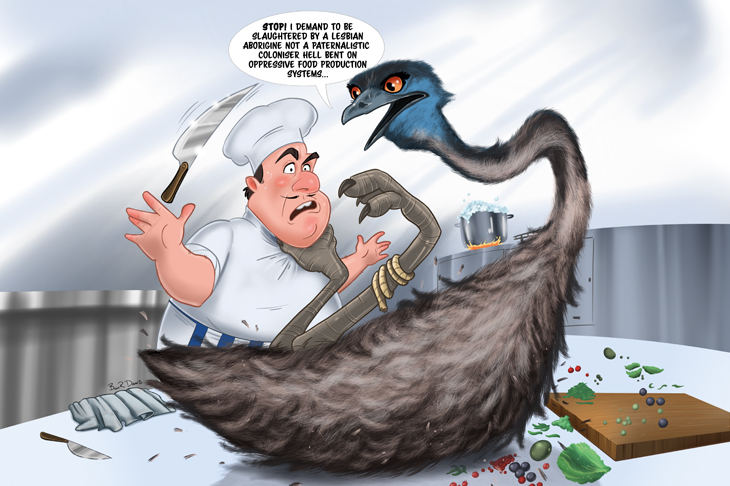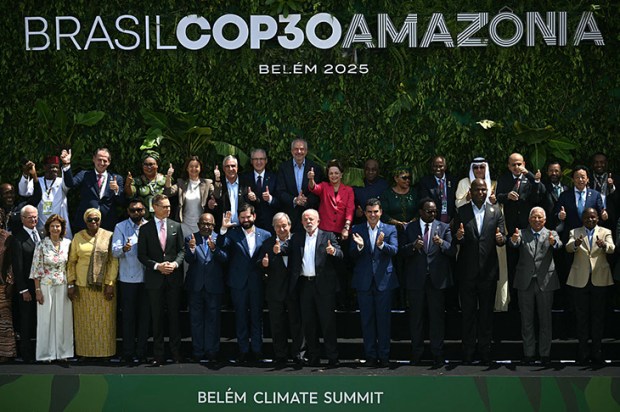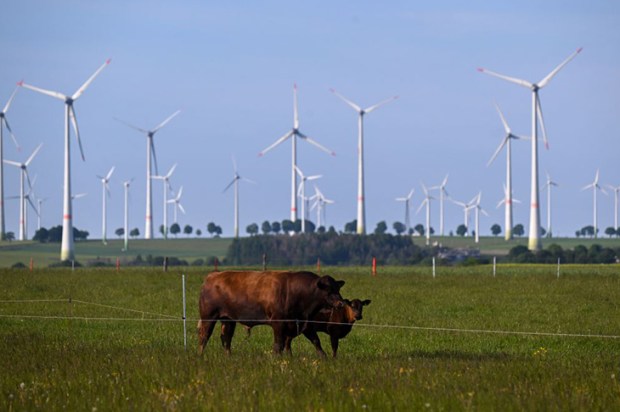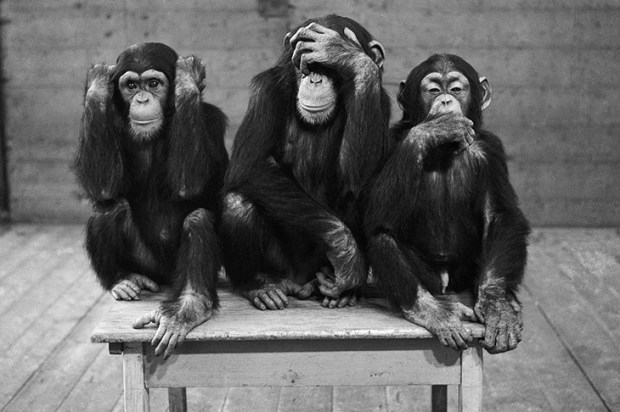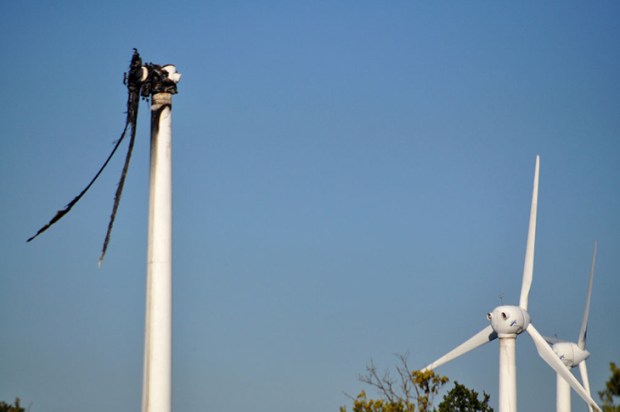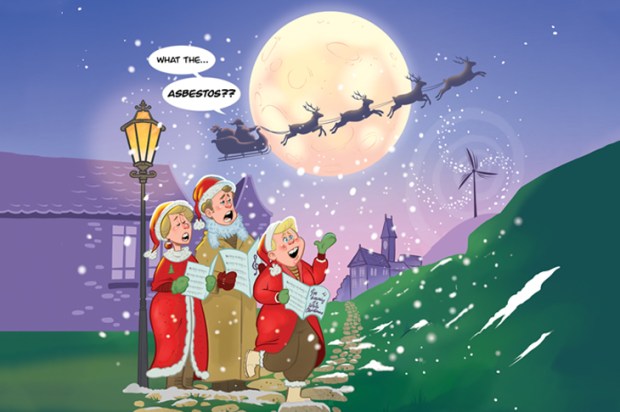On a recent Qantas flight from Sydney to Melbourne, I opened the inflight magazine and after flicking past interminable articles about sustainability, I landed on the restaurant section in the hope that it might be free of the virtue signalling at which our national airline excels. My eye was drawn to a new Torres Strait Islander restaurant called Big Esso which opened in Melbourne’s Federation Square a couple of months ago and my interest was piqued.
Upon landing, further research revealed that Big Esso appears to be going great guns. It has even managed the impossible, which is to inject new life into Melbourne’s moribund Federation Square, whose main problem stems from the fact that it’s not actually a square. Big Esso’s chef-owner says that her mission is to ‘make indigenous ingredients and cuisine more accessible’ and so has put together a menu which features such dishes as ‘Kangaroo tail and pepperberry bourguignon, island fried scone’, ‘Kebi Ebur-wattleseed crumbed spatchcock, Congo pomme purée, quail brown sauce, yam crisps’ and ‘Charred emu, kutjera (desert raisin), pepperberry, molasses, cassava crisps.’
So far so good. It all sounds quite delicious. But on closer inspection, I have realised that I will never be able to sample the complex flavours of wattleseed crumbed spatchcock paired with Congo pomme purée. This is because Big Esso informs prospective diners that ‘We are working towards a sustainable and socially driven supply chain. Where possible, we source from First Nations, queer-led, women-led, and environmentally conscious producers who align with our ethos.’
I have a great many questions for the management, none of which are adequately addressed on the website. For instance, how will I know if my emu was sourced, packaged and shipped off to Melbourne by a queer producer or a First Nations producer? Will the quality of the pepperberries indicate whether they were sourced by members of the LGBTQ+ community or just plain old heterosexual men? Does the producer’s sexual orientation or skin colour improve or diminish the quality of what is on my plate? If the berries were sourced by a queer Indigenous woman, does this make them taste better than if they were sourced by a queer Indigenous man?
Welcome to the Foucauldian world of ‘food justice’ or ‘postcolonial food politics’ which has been simmering away in Western humanities departments and is now being served up in our restaurants. The central thesis is that Western food production is just another oppressive system which needs to be deconstructed in order to put an end to social inequality, discrimination, racism and sexism. Agriculture is considered patriarchal, white supremacist and heteronormative and colonial food production serves the interest of the dominant hierarchy. It suggests that there is an ethical responsibility to deconstruct and challenge how food is sourced and produced, and the way to do this is to prioritise other systems.
Unsurprisingly, Australian academics have embraced ‘postcolonial food politics’ with gusto. In his book Unsettling Food Politics. Agriculture, Dispossession and Sovereignty in Australia, Christopher Mayes, Senior Research Fellow in the Faculty of Arts at the Alfred Deakin Institute posits that ‘the industrialised global food system erodes democracy, perpetuates injustices, undermines population health and is environmentally unsustainable.’ Mayes believes that colonial agricultural practices have caused historic injustices and that ‘contemporary agricultural practices reflect racism and the dispossession of indigenous peoples.’
It is of course, entirely in keeping with the restaurant’s ethos that it also makes sure to ‘acknowledge the Traditional Owners of the land on which we are based in Naarm (Melbourne); the Wurundjeri and neighbouring Boonwurrung Peoples of the Kulin Nation, and we pay our respects to their Elders, past, present and emerging.’ Finally, it declares in no uncertain terms that ‘Sovereignty was never ceded.’
If that is the case, I would like to know how much of the proceeds of this business, including the shop which sells stubby holders and tee-shirts, is going to the descendants of the Wurundjeri and neighbouring Boonwurrung people from whom they believe that the land has been stolen.
And while Big Esso means ‘the biggest thank you’ in Torres Strait Islander slang, it seems to me that any customers who cannot trace their lineage back to the Traditional Owners are also being told that they are not really welcome. Sorry Big Esso, but unfortunately, it’s the Biggest No Thank You from me.
The hyper-politicising of everything in our lives is becoming intolerable. We are no longer permitted to go out with friends and family to enjoy good food without being told that we are racist oppressors occupying stolen land. Nor, it seems, are we allowed to appreciate good music without being harangued about reinforcing forms of inequality, the gender pay gap, systemic injustice, and social inequality.
A UK-based organisation called ‘Donne, Women in Music’ which is ‘dedicated to achieving gender equality in the music industry’ recently published its latest research report which analysed the repertoire of over a hundred orchestras from 31 countries, including the Adelaide, Melbourne, Queensland and Sydney Symphony Orchestras. Its purpose was to look at equality and diversity in concert programming in 2021-2022.
The report’s main finding was that less than 0.1 per cent of the classical music pieces performed by 111 orchestras were written by non-binary composers. Shocking! Of the 20,400 compositions examined, 92.3 per cent were composed by men but only 7.7 per cent of the works were written by women. 87.7 per cent were composed by white men and 76.4 per cent of those men were dead. So, there you have it. By going to a performance of Beethoven’s Fifth, you are oppressing women and other minorities.
What kind of person worries about if their food has been sourced by queer-led producers, or makes distinctions about composers based on race and gender? The same kind of person who makes divisive group identity the only thing that matters, and who has rejected the notion of a shared humanity. It’s the person who has lost the idea of what it is to participate in something that transcends human nature, and who is trying to drag the rest of us down with them.
Got something to add? Join the discussion and comment below.
Dr Bella d’Abrera is the Director of the Foundations of Western Civilisation at the Institute of Public Affairs.
You might disagree with half of it, but you’ll enjoy reading all of it. Try your first month for free, then just $2 a week for the remainder of your first year.


